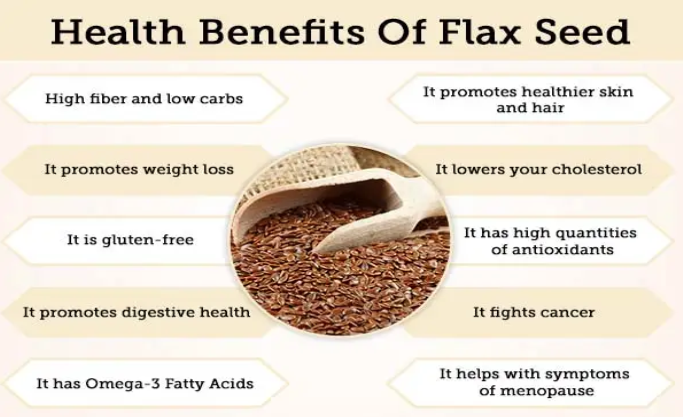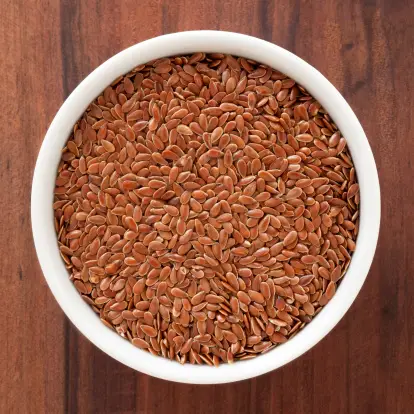In the realm of superfoods, flaxseed often stands out as a tiny but mighty contender. With its rich nutritional profile and versatile uses, it has gained significant attention among health-conscious individuals. Through this article, we’ll delve into the myriad benefits of flaxseed while also addressing potential side effects to ensure a balanced understanding of its role in a healthy diet.
Health Benefits of Flaxseed:
Flaxseed, also known as linseed, comes from the flax plant and has been cultivated for thousands of years for its various uses. Following pointers highlights the health benefits of flaxseeds.
- Heart Health: The omega-3 fatty acids in flaxseed, particularly alpha-linolenic acid (ALA), have been linked to reducing the risk of cardiovascular disease by lowering blood pressure, cholesterol levels, and inflammation.
- Digestive Health: Flaxseed is an excellent source of dietary fiber, which promotes digestive regularity, prevents constipation, and supports gut health.
- Weight Management: The fiber and healthy fats in flaxseed contribute to a feeling of fullness, which may aid in weight management by curbing appetite and promoting satiety.
- Hormonal Balance: Lignans found in flaxseed have been studied for their potential to balance hormones, particularly in women, which may help alleviate symptoms of menopause and promote overall hormonal health.
- Antioxidant Properties: Flaxseed contains antioxidants, including lignans and phenolic compounds, which help combat oxidative stress and reduce the risk of chronic diseases.

Potential Side Effects and Considerations:
While flaxseed offers numerous health benefits, it’s essential to be mindful of potential side effects and considerations:
- Digestive Issues: Consuming large quantities of flaxseed, especially ground flaxseed, without adequate water intake may lead to digestive discomfort, such as bloating, gas, or diarrhea.
- Allergic Reactions: Some individuals may be allergic to flaxseed, experiencing symptoms like itching, hives, or difficulty breathing. If you have a known allergy to flaxseed or related plants, it’s crucial to avoid it altogether.
- Interactions with Medications: Flaxseed supplements or large amounts of flaxseed in the diet may interact with certain medications, such as blood thinners or hormone therapies. Consult with a healthcare professional before incorporating flaxseed into your regimen, especially if you’re taking medications or have underlying health conditions.
Incorporating Flaxseed into Your Diet:
Adding flaxseed to your diet can be easy and delicious. Here are some simple ways to incorporate it into your daily routine:
- Sprinkle ground flaxseed over yogurt, oatmeal, or smoothie bowls for a nutty flavor and added nutrition.
- Use flaxseed oil as a dressing for salads or drizzle it over cooked vegetables for a boost of omega-3 fatty acids.
- Mix ground flaxseed into baked goods like muffins, pancakes, or bread for added fiber and texture.
- Blend whole flaxseed into homemade energy bars or granola for a nutritious snack on the go.
Flaxseed emerges as a nutritional powerhouse, offering a plethora of health benefits ranging from heart health to hormonal balance. However, it’s essential to consume it mindfully, considering potential side effects and interactions. By incorporating flaxseed into your diet in moderation and consulting with a healthcare professional, if necessary.
Frequently Asked Questions
1. How much flaxseed should I consume daily?
The recommended daily intake of flaxseed varies depending on individual factors such as age, sex, and overall health. As a general guideline, consuming 1-2 tablespoons of ground flaxseed per day is considered safe and beneficial for most adults. However, it’s essential to start with a smaller amount and gradually increase your intake to assess tolerance and avoid digestive discomfort.
2. Can flaxseed help with weight loss?
Flaxseed may aid in weight loss and management due to its high fiber content, which promotes feelings of fullness and reduces appetite. Incorporating flaxseed into a balanced diet and active lifestyle may support weight loss goals by providing essential nutrients while curbing cravings and promoting satiety.
3. Is it better to consume whole flaxseed or ground flaxseed?
While both whole and ground flaxseed offer nutritional benefits, ground flaxseed is more readily absorbed by the body. Grinding flaxseed helps break down its tough outer shell, allowing for better absorption of nutrients, including omega-3 fatty acids and lignans. Therefore, it’s recommended to consume ground flaxseed for maximum nutritional impact.
4. Can flaxseed help lower cholesterol levels?
Yes, flaxseed has been shown to have cholesterol-lowering effects, primarily attributed to its high content of soluble fiber and omega-3 fatty acids. Incorporating flaxseed into your diet may help reduce LDL (bad) cholesterol levels and improve overall heart health. However, it’s essential to complement flaxseed consumption with other heart-healthy lifestyle habits, such as regular exercise and a balanced diet.
5. Are there any special considerations for pregnant or breastfeeding women?
Flaxseed is generally considered safe for pregnant and breastfeeding women when consumed in moderation as part of a balanced diet. However, it’s essential to consult with a healthcare professional before incorporating flaxseed supplements or consuming large amounts of flaxseed, as individual needs may vary. Pregnant and breastfeeding women should also be mindful of potential allergic reactions and digestive issues.
6. Can flaxseed interact with medications?
Flaxseed supplements or large amounts of flaxseed in the diet may interact with certain medications, including blood thinners (anticoagulants) and hormone therapies. Flaxseed contains compounds that can affect blood clotting and hormone levels, potentially altering the effectiveness of these medications. If you’re taking medications or have underlying health conditions, it’s crucial to consult with a healthcare professional before adding flaxseed to your regimen.
By addressing these common questions, you can make informed decisions about incorporating flaxseed into your diet and reap its numerous health benefits while minimizing potential risks. If you have additional questions or concerns about flaxseed, don’t hesitate to consult with a healthcare professional or registered dietitian for personalized guidance and recommendations.


The articles you write help me a lot and I like the topic
Can you write more about it? Your articles are always helpful to me. Thank you!
Thank you for your comments, soon we will come up with such post.
You’ve the most impressive websites.
Great site you have got here.. It’s difficult to find high quality writing like yours these days. I honestly appreciate individuals like you! Take care!!
Thank you for providing me with these article examples. May I ask you a question?
I love it when folks get together and share views. Great blog, continue the good work!
Thanks , I have just been looking for information about this subject for ages and yours is the best I have discovered till now. But, what about the conclusion? Are you sure about the source?
whoah this blog is magnificent i love reading your articles. Keep up the great work! You know, a lot of people are looking around for this info, you can aid them greatly.
Heya i抦 for the first time here. I found this board and I find It truly useful & it helped me out much. I hope to give something back and help others like you helped me.
Of course, what a splendid blog and instructive posts, I will bookmark your site.Best Regards!
Thanks for the marvelous posting! I really enjoyed reading it, you might be a great author.I will make certain to bookmark your blog and may come back later on. I want to encourage continue your great posts, have a nice holiday weekend!
this web site is my inspiration , very great style and perfect articles.